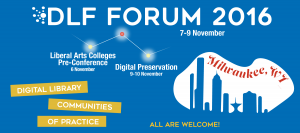I always appreciate the bird’s-eye view of the work I do gained by attending national conferences, and often come away with novel ideas on how to solve old problems and colleagues to reach out to when I encounter new ones. So I was anticipating as much when I left home for the airport last week to attend the 2016 DLF Forum in Milwaukee, Wisconsin.
And that is indeed the experience I had, but in addition to gaining new ideas and new friends, the keynote for the conference challenged me to think deeply about the broader context in which we as librarians and information professionals do our work, who we do that work for, and whether or not we are living up to the values of inclusivity and accessibility that I hold dear.
The keynote speaker was Stacie Williams, a librarian/archivist who talked about the politics of labor in our communities, both specific to libraries and archives and beyond. She posited that all labor is local, and focused on the caregiving work that, so often performed by women and minorities in under- or unpaid positions, is the “beam underpinning this entire system of labor as we know it … and yet it remains the most invisible part of what makes our economy run”. In order to value ourselves and our work, we need to value all of the labor upon which our society is based. And she asked us to think of the work we do as librarians and archivists – the services we provide – as a form of caregiving to our own communities. She also posited that the information work in which we are engaged has followed the late capitalism trend of an anti-care ethos, and implored us to examine our own institutional practices, asking questions such as:
- Do we engage in digitization projects where work was performed by at-will workers with no benefits or unpaid interns, or outsourced to prison workers?
- Are we physically situated on university campuses that are inaccessible to our local community, either by way of location or prohibitive expense?
- Have we undergone extreme cuts to our workforces, hindering our ability to provide services?
- Do our hiring practices replicate systems that reward racial/gender class standards?
- Do we build positions into grants that don’t pay living wages?
Williams asked us to interrogate the ways in which our labor practices are problematic and to center library work in the care ethics necessary “to reflect the standards of access and equality that we say we hold in this profession”. As a metadata specialist who spends a large chunk of her time working to create description for cultural heritage materials, this statement was especially resonant: “Few things are more liberatory than being able to tell your own story and history and have control and stewardship over your cultural narrative”. This is a tension I am especially aware of – describing resources for discovery and access in ways that honor and reflect the voices and self-identity of original creators or subjects.
The following days were of course filled with interesting and useful panels and presentations, working lunches, and meetups with new and old colleagues. But the keynote, along with the context of the national election, infused the rest of the conference with a spirit of thoughtfulness and openness toward engaging in a deep exploration of our labor practices and relationships to the communities of people we serve. It has given me a lot to think about, and I’m grateful to the DLF Forum planners for bringing this level of discourse to the annual conference.



